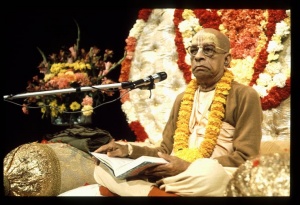SB 7.12.26-28: Difference between revisions
(Vanibot #0018 edit: make synonym terms in Sanskrit italic in SB - Vanisource) |
(Vanibot #0054 edit - transform synonyms into clickable links, which search similar occurrences) |
||
| Line 33: | Line 33: | ||
<div class="synonyms"> | <div class="synonyms"> | ||
''vācam'' | ''[//vanipedia.org/wiki/Special:VaniSearch?s=vācam&tab=syno_o&ds=1 vācam]'' — speech; ''[//vanipedia.org/wiki/Special:VaniSearch?s=agnau&tab=syno_o&ds=1 agnau]'' — in the fire-god (the personified god controlling fire); ''[//vanipedia.org/wiki/Special:VaniSearch?s=sa&tab=syno_o&ds=1 sa]-[//vanipedia.org/wiki/Special:VaniSearch?s=vaktavyām&tab=syno_o&ds=1 vaktavyām]'' — with the subject matter of speaking; ''[//vanipedia.org/wiki/Special:VaniSearch?s=indre&tab=syno_o&ds=1 indre]'' — unto King Indra; ''[//vanipedia.org/wiki/Special:VaniSearch?s=śilpam&tab=syno_o&ds=1 śilpam]'' — craftsmanship or the capacity to work with the hands; ''[//vanipedia.org/wiki/Special:VaniSearch?s=karau&tab=syno_o&ds=1 karau]'' — as well as the hands; ''[//vanipedia.org/wiki/Special:VaniSearch?s=api&tab=syno_o&ds=1 api]'' — indeed; ''[//vanipedia.org/wiki/Special:VaniSearch?s=padāni&tab=syno_o&ds=1 padāni]'' — the legs; ''[//vanipedia.org/wiki/Special:VaniSearch?s=gatyā&tab=syno_o&ds=1 gatyā]'' — with the power to move; ''[//vanipedia.org/wiki/Special:VaniSearch?s=vayasi&tab=syno_o&ds=1 vayasi]'' — unto Lord Viṣṇu; ''[//vanipedia.org/wiki/Special:VaniSearch?s=ratyā&tab=syno_o&ds=1 ratyā]'' — sexual desire; ''[//vanipedia.org/wiki/Special:VaniSearch?s=upastham&tab=syno_o&ds=1 upastham]'' — with the genitals; ''[//vanipedia.org/wiki/Special:VaniSearch?s=prajāpatau&tab=syno_o&ds=1 prajāpatau]'' — unto Prajāpati; ''[//vanipedia.org/wiki/Special:VaniSearch?s=mṛtyau&tab=syno_o&ds=1 mṛtyau]'' — unto the demigod known as Mṛtyu; ''[//vanipedia.org/wiki/Special:VaniSearch?s=pāyum&tab=syno_o&ds=1 pāyum]'' — the rectum; ''[//vanipedia.org/wiki/Special:VaniSearch?s=visargam&tab=syno_o&ds=1 visargam]'' — with its activity, evacuation; ''[//vanipedia.org/wiki/Special:VaniSearch?s=ca&tab=syno_o&ds=1 ca]'' — also; ''[//vanipedia.org/wiki/Special:VaniSearch?s=yathā&tab=syno_o&ds=1 yathā]-[//vanipedia.org/wiki/Special:VaniSearch?s=sthānam&tab=syno_o&ds=1 sthānam]'' — in the proper place; ''[//vanipedia.org/wiki/Special:VaniSearch?s=vinirdiśet&tab=syno_o&ds=1 vinirdiśet]'' — one should indicate; ''[//vanipedia.org/wiki/Special:VaniSearch?s=dikṣu&tab=syno_o&ds=1 dikṣu]'' — unto different directions; ''[//vanipedia.org/wiki/Special:VaniSearch?s=śrotram&tab=syno_o&ds=1 śrotram]'' — the aural sense; ''[//vanipedia.org/wiki/Special:VaniSearch?s=sa&tab=syno_o&ds=1 sa]-[//vanipedia.org/wiki/Special:VaniSearch?s=nādena&tab=syno_o&ds=1 nādena]'' — with sound vibration; ''[//vanipedia.org/wiki/Special:VaniSearch?s=sparśena&tab=syno_o&ds=1 sparśena]'' — with touch; ''[//vanipedia.org/wiki/Special:VaniSearch?s=adhyātmani&tab=syno_o&ds=1 adhyātmani]'' — unto the wind-god; ''[//vanipedia.org/wiki/Special:VaniSearch?s=tvacam&tab=syno_o&ds=1 tvacam]'' — the sense of touch; ''[//vanipedia.org/wiki/Special:VaniSearch?s=rūpāṇi&tab=syno_o&ds=1 rūpāṇi]'' — form; ''[//vanipedia.org/wiki/Special:VaniSearch?s=cakṣuṣā&tab=syno_o&ds=1 cakṣuṣā]'' — with eyesight; ''[//vanipedia.org/wiki/Special:VaniSearch?s=rājan&tab=syno_o&ds=1 rājan]'' — O King; ''[//vanipedia.org/wiki/Special:VaniSearch?s=jyotiṣi&tab=syno_o&ds=1 jyotiṣi]'' — in the sun; ''[//vanipedia.org/wiki/Special:VaniSearch?s=abhiniveśayet&tab=syno_o&ds=1 abhiniveśayet]'' — one should endow; ''[//vanipedia.org/wiki/Special:VaniSearch?s=apsu&tab=syno_o&ds=1 apsu]'' — unto water; ''[//vanipedia.org/wiki/Special:VaniSearch?s=pracetasā&tab=syno_o&ds=1 pracetasā]'' — with the demigod known as Varuṇa; ''[//vanipedia.org/wiki/Special:VaniSearch?s=jihvām&tab=syno_o&ds=1 jihvām]'' — the tongue; ''[//vanipedia.org/wiki/Special:VaniSearch?s=ghreyaiḥ&tab=syno_o&ds=1 ghreyaiḥ]'' — with the object of smell; ''[//vanipedia.org/wiki/Special:VaniSearch?s=ghrāṇam&tab=syno_o&ds=1 ghrāṇam]'' — the power to smell; ''[//vanipedia.org/wiki/Special:VaniSearch?s=kṣitau&tab=syno_o&ds=1 kṣitau]'' — in the earth; ''[//vanipedia.org/wiki/Special:VaniSearch?s=nyaset&tab=syno_o&ds=1 nyaset]'' — one should give. | ||
</div> | </div> | ||
Latest revision as of 22:53, 18 February 2024

A.C. Bhaktivedanta Swami Prabhupada
TEXTS 26-28
- vācam agnau savaktavyām
- indre śilpaṁ karāv api
- padāni gatyā vayasi
- ratyopasthaṁ prajāpatau
- mṛtyau pāyuṁ visargaṁ ca
- yathā-sthānaṁ vinirdiśet
- dikṣu śrotraṁ sa-nādena
- sparśenādhyātmani tvacam
- rūpāṇi cakṣuṣā rājan
- jyotiṣy abhiniveśayet
- apsu pracetasā jihvāṁ
- ghreyair ghrāṇaṁ kṣitau nyaset
SYNONYMS
vācam — speech; agnau — in the fire-god (the personified god controlling fire); sa-vaktavyām — with the subject matter of speaking; indre — unto King Indra; śilpam — craftsmanship or the capacity to work with the hands; karau — as well as the hands; api — indeed; padāni — the legs; gatyā — with the power to move; vayasi — unto Lord Viṣṇu; ratyā — sexual desire; upastham — with the genitals; prajāpatau — unto Prajāpati; mṛtyau — unto the demigod known as Mṛtyu; pāyum — the rectum; visargam — with its activity, evacuation; ca — also; yathā-sthānam — in the proper place; vinirdiśet — one should indicate; dikṣu — unto different directions; śrotram — the aural sense; sa-nādena — with sound vibration; sparśena — with touch; adhyātmani — unto the wind-god; tvacam — the sense of touch; rūpāṇi — form; cakṣuṣā — with eyesight; rājan — O King; jyotiṣi — in the sun; abhiniveśayet — one should endow; apsu — unto water; pracetasā — with the demigod known as Varuṇa; jihvām — the tongue; ghreyaiḥ — with the object of smell; ghrāṇam — the power to smell; kṣitau — in the earth; nyaset — one should give.
TRANSLATION
Thereafter, the object of speech, along with the sense of speech [the tongue], should be bestowed upon fire. Craftsmanship and the two hands should be given to the demigod Indra. The power of movement and the legs should be given to Lord Viṣṇu. Sensual pleasure, along with the genitals, should be bestowed upon Prajāpati. The rectum, with the power of evacuation, should be bestowed, in its proper place, unto Mṛtyu. The aural instrument, along with sound vibration, should be given to the deities presiding over the directions. The instrument of touch, along with the sense objects of touch, should be given to Vāyu. Form, with the power of sight, should be bestowed upon the sun. The tongue, along with the demigod Varuṇa, should be bestowed upon water, and the power of smell, along with the two Aśvinī-kumāra demigods, should be bestowed upon the earth.